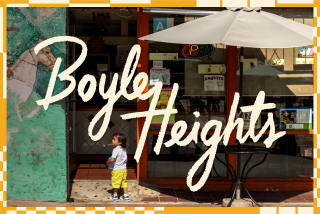Bangladesh Newcomers Transplant Traditions to London’s East End
- Share via
LONDON — Just a 20-minute walk east of the spires of London’s financial district and the dome of St. Paul’s Cathedral, signs of England give way to the sounds and smells of the Asian subcontinent.
The mosque’s wailing call to prayer drowns out the toll of the church bell, swishing saris replace pinstripes and the smell of roast lamb and spice fills the air in Brick Lane--the “new world” for Britain’s latest immigrants, people from Bangladesh.
The first arrivals stepped off boats three decades ago and settled in the East End neighborhood. Like the Jews once predominant in Brick Lane, the Bangladeshis have struggled to learn English, find shelter and work, and preserve their culture.
A century ago Brick Lane was an area of infamous squalor, where Jack the Ripper stalked his victims.
Its Jewish residents began leaving after it was heavily bombed during World War II. Now, 160,000 Bangladeshis, the single largest concentration in Britain, inhabit the low-built houses and narrow streets.
They have built five mosques in a square-mile area, and opened leather shops and grocery stores filled with chutneys and mangoes.
The Bangladeshis also have adopted a higher profile in demanding their rights as Muslims.
They want more segregation of boys and girls in public schools where their children are in the majority and government money for their private schools.
Another issue these days is Salman Rushdie’s novel “The Satanic Verses,” which many Muslims say slanders Islam.
Not all support Iranian leader Ayatollah Ruhollah Khomeini’s call to kill Rushdie and his publishers. But they vociferously denounce the novel as an insult to their faith.
In many ways the issue is not about Rushdie’s book, said Iqbal Wahhab, editor of the Asian Herald, an English-language weekly.
“It was about the reassertion of Muslim values onto British society which they feel have been ignored,” he said.
The Bangladeshis have begun to think of England as home.
“Five, 10 years ago, our people sent all money to Bangladesh and think, ‘I’m just working here,’ ” said Siraz Miah, a 28-year-old whose tiny leather factory sits above a narrow staircase strewn with leather scraps.
“Now we think it’s our country. Now people have house and business. Now is better.”
Amid the acrid smell of chemicals, his 12 workers stitch 300 jackets a week on old sewing machines surrounded by head-high piles of hide. They are among the fortunate; 27% of East End Bangladeshis are jobless.
It was factories like Miah’s that prompted Prince Charles, during a 1987 visit, to liken Brick Lane’s workplaces to sweatshops.
Something must be done, said the heir to the British throne, and London’s business community responded with $2.6 million in donations for projects to create jobs.
Many of the earliest Bangladeshis to settle in London were ship’s cooks who had few skills and came alone, intending to return home someday.
Families followed, sometimes nearly a decade later because of Britain’s tightening immigration laws, and a community grew. Now their children speak with Cockney accents.
“We have heard that Muslim girls choose boyfriends freely and go to discos. It’s worrying us--what comes next?” said Daslim-Ali, a leader of the East London Mosque near Brick Lane.
Others trust the collective identity forged in Brick Lane to teach their children.
“Nowadays lots of Bangladeshis are here, so our children know how we behave,” said Taiyabur Rahman, 55, who came in 1959 to open the first Bangladeshi travel agency in London. “As long as our children are with us, they won’t be lost.”
But while life improves, problems remain.
Racist violence, a threat wherever Britain’s 800,000 Asian immigrants are clustered, is acute in the Tower Hamlets neighborhood.
The Tower Hamlets Assn. for Racial Equality said it received about 2,500 complaints of racial harassment in 1987, mostly involving beatings and broken windows. It also said seven Asian homes were set afire.
Brick Lane still has a few reminders of its Jewish past, including an all-night bagel shop and the J. Minsky and Sons textile store.
Sidney Minsky, whose father started the business in 1902, eagerly shows a visitor around Asian stores in old tenements.
“The Asians show you how a business can be run,” he said.
More to Read
Sign up for Essential California
The most important California stories and recommendations in your inbox every morning.
You may occasionally receive promotional content from the Los Angeles Times.











